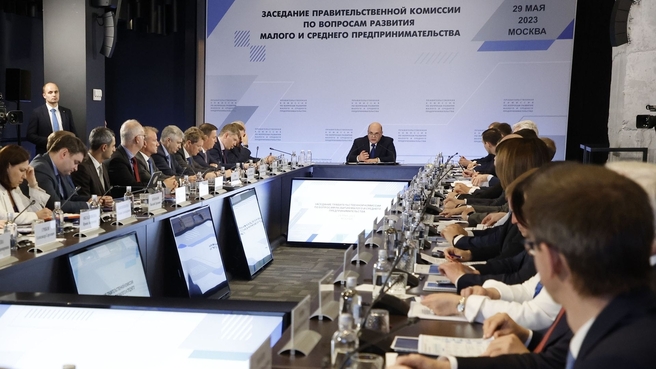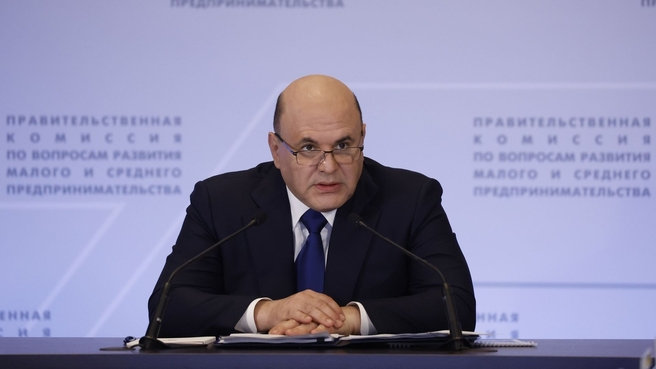Mikhail Mishustin: “We will discuss in detail the accumulated experience of implementing the profile national project. We will determine the main goals for the mid-term perspective. We will review what measures are essential in supporting small and medium businesses. We will see what else we can do for the most effective implementation of the adopted resolutions. We will make sure the support measures we are discussing and adopting meet the expectations of small businesses.”
Excerpts from the transcript:
Mikhail Mishustin: Good afternoon, colleagues.
Before we begin, I would like to congratulate all those present on your recent professional holiday – the Day of Russian Entrepreneurship. In addressing you, I would like to thank all businesspeople – both those that are just starting their businesses and those at long established companies – for their contribution to the development of the country, as well as their initiative and desire to create new things that have a positive impact on the economy.
At the meeting with representatives from Delovaya Rossiya, the President emphasised that the restoration of the historical traditions of domestic businesses and entrepreneurship and the development of new ones are key factors in the maintenance of social stability and our sovereignty. The President suggested announcing a five-year period of entrepreneurship in Russia, and it is important to fill this with specific, practical work. The President has determined the main areas. They include the improvement of the business, the investment climate, the growth of the efficiency and modernisation of economic industries, and of course, the personnel and professional education and new formats of public-private partnership. It is necessary to conduct this work in close interaction with the regions, municipalities, and public and business associations.
Today, we will conduct a meeting of the Government Commission on the Development of Small and Medium Businesses. We will discuss in detail the accumulated experience of implementing this profile national project. We will determine the main goals for the mid-term perspective. We will review what measures are essential to support small and medium businesses. We will see what else we can do for the most effective implementation of the adopted resolutions. We will make sure the support measures we are discussing and adopting meet the expectations of small businesses. What we want to achieve should coincide with the views of small and medium business owners. This feedback is badly needed, as the President always reminds us.
Small businesses not only create new jobs but also largely help create a comfortable environment for the Russian people. Small and medium businesses are taking part in resolving many issues that are vital for people. And, of course, they facilitate the promotion of interesting ideas and innovations.
Today we became convinced of this when we visited the technology park.
An entire system of assistance measures is in effect now, with special lending conditions, loan guarantees, and grants for social and young entrepreneurs.
Last year, they received about 1.2 trillion roubles at preferential rates. For all key support tools, coverage has been increased.
Work within the national project has been structured. Measures are identified that are aimed at creating conditions to launch a business easily, as well as for a comprehensive acceleration system to strengthen the growth of companies.
A year ago, incentives were also strengthened to increase demand for entrepreneurs’ products. For example, the quota for state-owned company procurement has been increased from 20 to 25 percent. We discussed this at the previous commission meeting.
As a result, the largest clients have invested over seven trillion roubles in this. Consultative, educational and marketing assistance is provided both to businesses and self-employed citizens.
Over four years, about 40 industrial parks have been created for those organisations that are engaged in production. We are supporting exporters.
And, of course, we tried to enhance the positive effect of this approach to business by developing a more flexible tax arrangement. Last year, two such mechanisms were launched at once.
The automated simplified taxation system is designed for companies and entrepreneurs with up to five employees and an annual income of up to 60 million roubles. It helps them get rid of red tape and, most importantly, almost completely eliminates data reporting.
Additionally, restaurants and cafes (whose annual income is below 2 billion roubles) are exempted from VAT. After an extended discussion, we gave the green light to this experiment. In addition, if they employ less than 1,500 people, they will pay insurance premiums of 15 percent, not 30 percent.
All these measures are yielding results. Despite the challenges associated first with the pandemic, then with the sanctions, the number of SMEs has grown over the past four years. According to the results of the last quarter of last year, the number of people employed in small businesses exceeded 28 million, primarily due to almost 4 million individual entrepreneurs and self-employed people, who now number more than 7.5 million.
At the same time, we continue to improve the tools that allow us to provide more targeted assistance. We have adjusted the unified register of SMEs and the register of grant recipients and recipients of other types of support. Significant progress has been made in the processing of analytical data, thanks to which we managed to quickly ensure the adjustment and increase the effectiveness of both the measures themselves and the resources for their implementation.
Interaction between the state and the business community is being transferred to the digital space. We have launched the MSP.RF platform. Thanks to this, today you can receive services remotely from anywhere in the country. I would recommend that everyone become familiar with all the services this platform offers. A lot of work has been done to analyse the possible scenarios and to make the relevant services convenient, understandable and intuitive. And today, from various forms of support, such as federal, sectoral, regional, and municipal, if any, to mentors, all this can be found on MSP.RF.
One very important area is to reduce the administrative burden. Last year, a moratorium on inspections was introduced. They were still carried out in exceptional cases – like for risks to the life and health of consumers– and only in relation to a limited number of businesses.
As a result, the number of these inspections fell to a historical low – less than 340,000. Of these, only a third were for SMEs. We are glad to see that businesses, for their part, also showed responsibility and conscientiousness.
This was achieved, among other things, by reorienting inspectors towards preventive work. Inspectors made over 560,000 preventive visits to help entrepreneurs and explain how to do it right instead of fining them.
I would like to mention in particular the situations in the Donetsk and Lugansk people’s republics, as well as in the Zaporozhye and Kherson regions. Almost 70,000 small and medium-sized companies operate there. We will continue to do everything necessary for these companies to develop.
One of the primary tasks today is the integration of these regions into the general system of support for small and medium businesses, which operates throughout the Russian Federation. We are forming an institutional base, and newly established individual entrepreneurs and legal entities are included in the unified register of SMEs. The Russian regions themselves are also joining this work: they are adopting appropriate laws and regulations to allow faster access to our measures.
In the future, it is necessary to ensure the opening of My Business centres in these regions, Mr Reshetnikov, and microfinance and regional guarantee organisations.
Colleagues,
Now it is necessary to determine further priorities for the development of small and medium-sized businesses. It is important to achieve a qualitative change in the sector and increase its contribution to macroeconomic indicators for the country as a whole. Of course, we should take into account the accumulated experience and all the challenges faced by our country.














